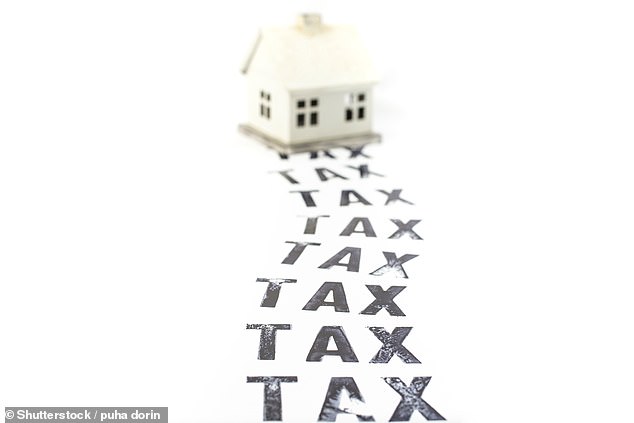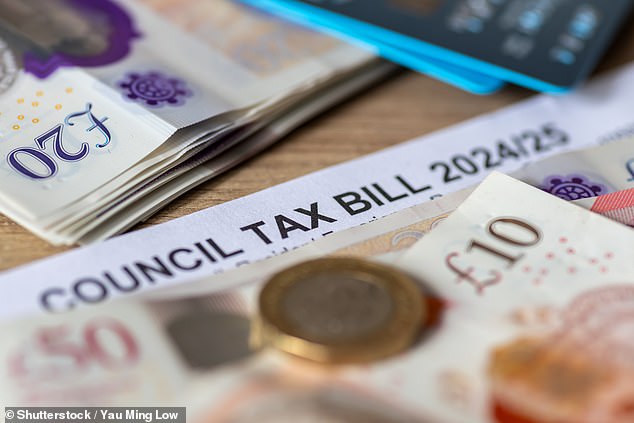As anyone who hasn’t been living under a rock for the last few years knows, the UK tax burden is the highest it has been since the Second World War.
And so you might think that the last thing the Government would be considering would be yet another tax to add to the multiple levies we are already paying.
But no, Labour circles are abuzz with talk of a brand new money-raising measure: a wealth tax.
As Andrew Neil so masterfully explained on these pages earlier this month, such a tax is always doomed to failure, costing the Exchequer far more in lost revenue than it raises.
But that is not the only reason to dismiss it out of hand. The fact is we pay far too many taxes already.
While the average household pays £16,700 in direct tax on income, our exclusive audit shows that this is just the tip of the iceberg.

Burden: There are a multitude of other taxes households must pay on top of direct taxation in the form of income tax and National Insurance
We all pay a multitude of other taxes, from air passenger duty to environmental levies on our energy bills.
This means that the average household pays not £16,700 but £31,623.50, an astonishing tax rate of 57 per cent.
Here we present a mind-boggling guide to the 37 – yes, 37 – levies that we already pay, and exactly how much they cost each of Britain’s 28.4 million households on average.
Tax burden in full
1. Income tax – £10,631 per average household
Introduced as a supposedly temporary measure by William Pitt the Younger in 1798 to raise cash for the Napoleonic Wars, income tax has long since become the government’s single biggest source of revenue.
It is paid by everyone with an income in excess of £12,570 a year. Above that level taxpayers pay 20 per cent on the first £37,700 of income, 40 per cent on any income between £37,700 and £125,141 and 45 per cent on anything above that.
Indeed, life gets complicated once you hit six figures. If you earn £100,000, the taxman whittles down your personal allowance by £1 for every extra £2 you earn.
In all, the government took £301.9 billion in income tax in 2024/25, which works out at an average of £10,631 for each of Britain’s 28.4 million households.
2. National insurance – £6,070
National insurance contributions (NICs) date back to 1911, when taxpayers were told they would be paying into a national insurance fund to look after them when they were old, fell sick or lost their job.
But there is not, and never has been, such a fund – all the receipts go straight into general government expenditure and welfare benefits are paid out of the government’s current income.
Anyone who earns more than £242 per week pays NICs, at a rate of 8 per cent. But it doesn’t end there. Employers also have to pay, at a rate of 15 per cent, for any employee who earns more than £96 per week.
In 2024/25, the government raised £48.1 billion in employees’ contributions and £116.1billion in employers’ contributions.
The total revenue raised (which also includes NICs paid by the self-employed) came to £172.4 billion, working out at an average of £6,070 per household.
3. Value added tax – £6,025
VAT came to Britain when we joined the then European Economic Community in 1973, replacing various other purchase taxes.
In 2024-25 it raised £171.1 billion, working out at an average of a hefty £6,025 per household.
4. Council tax – £1,768
According to the Office for Budgetary Responsibility (OBR), the total which will be raised by council tax this year is £50.2 billion – an average of £1,768 per household.

The total which will be raised by council tax this year is £50.2bn – an average of £1,768 per household
5. Corporation tax – £1,448
Companies pay tax on their profits at a rate of 25 per cent. While individuals aren’t hit by this tax directly, they are indirectly in two ways.
Firstly, corporation tax drives businesses to charge extra for their services. Secondly, many of us are shareholders, either directly or through our pension funds.
Given that 55 per cent of the shares in UK companies are held by overseas investors, let’s be fair and attribute only 45 per cent of the corporation tax burden to UK households.
Total revenue of £91.4billion in 2024-25 still works out at £1,448 per UK household.
6. Fuel duty – £869
Around half of what we pay at the pump disappears into the pockets of the government in the form of fuel duty.
In 2024-25, this tax raised a total of £24.7 billion. That wasn’t all paid by private motorists, as businesses have to pay it, too.
But the burden eventually falls on us as businesses are forced to pass on the costs to the consumer. The average burden per household last year was £869.
7. Business rates – £880
Most of us may not pay business rates directly but the companies that do would go bust if they didn’t pass them on to their customers in one form or another.
Total raised this year £25 billion – £880 per household
8. Stamp duty land tax – £489
Not everyone buys a home, and certainly not every year, but it can be a massive bill if you do. In 2024-25 it raised
£13.8 billion – an average of £489 per household.
9. Capital gains tax – £460
As its name suggests, CGT is a tax on the profit which individuals and businesses make selling an asset for a higher price than that which they paid for it.
Mercifully, our main homes are exempt from the levy, and not everyone will face a CGT bill in their lifetime.
But in 2024-25 it raised £13.1 billion, which works out at £460 for every household in the country
10. Alcohol taxes – £436
The most lucrative of the so-called sin taxes, alcohol levies raised £12.6 billion in 2024-25.
Of this, £4.7 billion came from wine, £4.2 billion from spirits, £3.5 billion from beer and £220million from cider. It all worked out at an average of £436 per household.

Sin tax: Alcohol levies raised £12.6bn in 2024-25. Of this, £4.7bn came from wine, £4.2bn from spirits, £3.5bn from beer and £220m from cider
11 Vehicle excise duty – £320
According to the OBR, we will collectively spend £9.1 billion taxing vehicles in 2025-26.
Not all this will be paid by individuals, but again we will all end up bearing the burden as businesses are forced to pass on the costs. Average cost per household: £320.
12. Insurance premium tax – £313
Most of us have some kind of insurance – from household contents to travel – which helped fill the government’s coffers to the tune of £8.9 billion last year, an average of £313 per household.
13. Tobacco duty – £279
Only around one in eight UK adults now smoke, but those who do pay through the nose.
Tobacco taxes raised £7.9 billion last year, an average of £279 per household.
14. Student loans repayment – £199
This is not strictly a tax but the imposition of an extra 9 per cent on income tax for graduates who earn over a certain threshold certainly makes it feel like one.
Average cost per household: £199
15. Customs duties – £173
Levies on goods imported to the UK raised £4.9 billion last year, a hidden burden which falls on us all to the tune of £173 per household.
16. Stamp duty on shares – £154
There is also stamp duty to pay on share purchases. Revenue raised in 2024/25: £4.4 billion, or £154 per household
17. Air passenger duty – £148
The duty levied on every passenger who flies from UK airports to both domestic and international destinations raised £4.2 billion last year, an average of £148 per household.
18. Social and environmental levies on energy bills – £141 (electricity), £41 (gas)
The government has hidden subsidies for green energy, insulation schemes and the like in our energy bills.
Last year, electricity consumers handed over an average of £141, while gas users paid £41.
19. TV licence – £133
Changing viewing habits and cost-of-living pressures are believed to be behind an increase in the number of people evading the £174.50 licence fee in recent years, with the estimated evasion rate rising to 11.30 per cent in 2023/24, up from 6.95 per cent in 2019/20.
This means that the number of households with a valid TV licence has decreased from 24.1 million to 23.8 million.
It nevertheless raised £3.8 billion in 2024-25, an average of £133 per household.
20. Betting/gambling tax – £127
You don’t have to have a flutter but, if you did, you helped contribute £3.6 billion to the Treasury last year, an average of £127 per household.
21. Emissions trading scheme – £127
The idea of subjecting businesses to annual caps on how much carbon they can emit – and forcing them to buy extra permits if they exceed those limits was dreamed up by the EU.
But guess what happened after Brexit. Britain invented its own parallel scheme. It raised £3.6 billion in 2024-25, with costs passed on to all of us at an average of £127 per household.
22. Energy profits levy – £95
The so-called ‘windfall’ tax on oil and gas production has outlived the oil and gas bonanza of 2022.
In 2024-25 it added £2.7 billion to the cost of producing oil and gas in Britain, with the burden inevitably passing to households – that’ll be £95 each/
23. Climate change levy – £63
Net Zero is supposed to make us richer, according to the Energy Secretary Ed Miliband.
But not if you are a business which has to pay the government’s climate change levy, a bill which – needless to say – gets passed down to all households.
It raised £1.78 billion last year, an average of £63 per household

Green fees: Energy Secretary Ed Miliband says Net Zero is supposed to make us richer, but households pay an average of £63 for the Climate Change Levy
24. Bank levy – £46
A special extra tax was imposed on banks after the 2008 financial crisis, supposedly to cover the cost of the banking bailouts and any future help the banking sector might need to save it from disaster.
But, as with all taxes, the burden ends up landing on the consumer, as it means banks are less able to offer favourable savings and borrowing rates.
In 2024-25 it raised £1.3 billion – equivalent to £46 per household
25. Banking surcharge – £30
For some reason, however, one extra tax on banks wasn’t enough. There is also a banking surcharge on corporation tax which raised £846 million in 2024/25, which works out at £30 per household
26. Penalties – £29
While they might not strictly be taxes, fines for filing late tax returns and the like are certainly a big revenue-raiser, earning the government £826 million last year, an average of £29 per household.
27. Digital services tax – £28
This tax is supposed to level the playing field with non-internet‑based businesses but, of course, it is yet another tax which ends up getting passed onto the consumer.
The £808 million raised last year works out at £28 per household
28. Electricity generator levy – £26
Bizarrely, as well as slapping a carbon tax on fossil fuel-generated power the last government also imposed a temporary levy on low carbon power, to target windfalls from high energy prices.
It runs until 2028 and in 2023/24 raised £743 million, or £26 per household
29. Landfill tax – £17
There’s even a tax for filling up the holes left behind by quarrying. For every ton of waste sent to landfill, we all end up paying. It raised £486 million last year, an average of £17 per household.
30. Apprenticeship levy – £14
Large businesses are obliged to fund apprenticeships even if they do not – or cannot – offer them themselves.
Total revenue in 2024/25 was £4.1 billion, the burden of which eventually trickles down to all of us through higher prices. Burden per household: £14.
31. Aggregates levy – £13
Environmental taxes have become a big money-spinner for the government. Quarrying aggregates such as sand and gravel incurred taxes of £359 million last year, £13 per household.
32. Soft drinks industry levy – £12
Thanks to the ‘sugar tax’, sticking to soft drinks rather than the hard stuff will no longer save you from the taxman. It raised £328 million in 2024-25 – an average of £12 per household.
33. Plastic packaging tax – £10
Introduced in 2022, this tax is levied on plastic packaging components – whether manufactured here or imported – that contain less than 30 per cent recycled plastic.
It raised £266 million last year, £10 per household.
34. Residential property development tax – £4
Just what we need when so many people find housing unaffordable: a new tax on building homes. Introduced by the Conservatives in 2022, last year it raised £102 million.
Not everyone buys a new home, of course, but the burden averages out at £4 per household.
35. Diverted profits tax – £4
The Conservatives came up with the idea of a tax on global corporations which seek to divert profits to more favourable tax regimes.
An alternative, of course, would have been to lower UK tax rates so that companies started diverting profits to this country rather foreign jurisdictions. It raised £105 million in 2024/25 – which works out at £4 per household.
36. Carrier bags – £1
Not strictly a tax as the money doesn’t go to the government, but the charge is mandated by the government.
The obligatory 10p charge for single-use plastic bags cost us a collective £37 million last year – just over £1 per household.
37. Economic crime levy – 50p
This is supposed to pay for anti-money laundering initiatives and is imposed on the finance industry, estate agents, etc. In 2024-25 it raised £13 million, or 50p per household.
Total taxes per average household: £31,623.50













